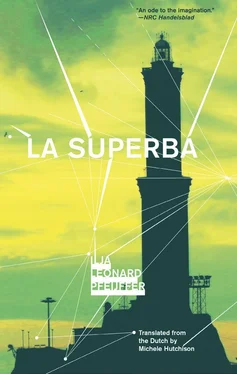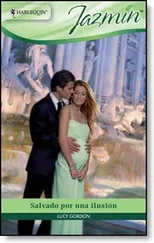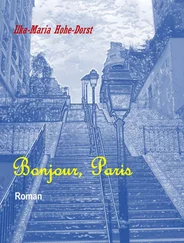“Did you press charges?”
“Why kind of funny question is that? Are you a foreigner or something? This is Italy.”
“Sorry. It’s just I thought…”
“You think too much. That’s your problem. Shall I get you off real quick before you go?”
“That’s a generous offer. But no thanks. And you’re right, it is time I went.”
“I feel like licking your little cunt, Giulia.”
“They all say that.” It was definitely time to go. “One last question.”
“Where my leg is?”
“Yes.”
“If only I knew.”
“Here in the Ghetto?”
He kicked my stomach. “Here?” He laughed loudly. “We rule the Ghetto. A Moroccan with a knife doesn’t stand a chance here. We once even went to war against the US Marines. And we won. Have you ever heard that story?”
“Yes.”
“Is there anything you don’t know?”
“I don’t know.”
“I do. I know how it works. When my sweet Moroccan fiancé turned up with his pals to settle scores, it wasn’t here. They’d never dare. Too many stiletto heels. Too much gravity. Too many alleyways that change direction from one second to the next. Moroccans know that. They’re stupid but not backwards. They pick their moments and their strategy. You mustn’t underestimate them, Giulia.”
“What do you mean?”
“They waited for me in some club, a long way away, under Via San Bernado, the gutter of the night.”
“I know the place.”
“Of course. I worked there as a tranny under various different names. I also went there to enjoy myself. Under other names.”
“Which names?”
“Too many to list. And they grabbed me in the alleyway and mutilated me. On the corner of Via San Bernardo and another alley.”
“Vico Vegetti.”
“Could be. And you know the strange thing, Giulia? A few weeks later, they found my leg in the burning woods above Arenzano. That’s quite bizarre, isn’t it? There was an item about it in the paper.”
“In Il Secolo XIX .”
“I’ve never understood how it got there.”
“What was your name again?”
“Ornella. Why?”
21.
Outside, I took a deep breath. It was vertiginous. I had to get out of there as fast as possible. I took the closest exit out of the Ghetto, to Via Lomellini. It felt like returning to the city after a long period in the wilderness — like I was being embraced by civilization. It was already light. The shops and bars were already open. Delivery boys were already pushing handcarts filled with crates of fruits and vegetables. There was a line at the fishmonger’s. He was shouting out that morning’s special offers in Genoese dialect. The magistrates of Genoa were on their way upwards, to Via Cairoli and Via Garibaldi, to the ancient palazzi of their power. They acted as if they had no knowledge of the dark jungle to their left. The poultryman on Piazza Fossatello was singing as he plucked chickens. Clean laundry fluttered on lines strung across the alleyways. I took another deep breath. The fresh air did me some good.
I went to the historical Bar Cavo on the corner of Via Lomellini, Piazza Fossatello, and Via San Luca for a cup of coffee. Seven carabinieri were standing at the bar. I squeezed between them and ordered a coffee. Their uniforms were spotless, I could verify that from close up. All their buttons were gleaming. I’ve rarely felt so safe drinking my morning coffee.
And in the long, narrow shopping street of San Luca, where it’s always busy, it was evidently busy even at this early hour. All the colors and scents, all the bustle, all the excited voices felt like a soothing shower after my nocturnal adventure. The excess of clear normality worked like an antidote to the black syrup of madness that had rendered my thoughts ever stickier. I slowly managed to see the truth without getting into a panic.
It was almost laughable. There was no longer a shadow of a doubt. It was completely clear to me. That woman’s leg — which I had passionately stroked, adored, kissed, and adored — had been a man’s leg. Simply because of the sexy stocking, I’d imagined the woman of my dreams attached to it. And the truth, the solution to the conundrum, everything the leg had been lacking, everything I’d lustfully added on in my thoughts, had been sitting next to me that night on a rickety stretcher bed in a garage in the Ghetto with cotton wool in his bra. Although you always realize that in some ways you are living in your fantasies, that realization becomes rather more acute when you get a retrospective glimpse into reality. It doesn’t happen often. Luckily.
Street musicians played the usual evergreens from the Balkans on their oh so authentically false accordions. “Maestro.” It was Salvatore. He whispered in my ear, “Will you promise me to never give them a penny? They aren’t really Romanians. They’re gypsies. They’re richer than you and me put together. They give honest people like me a bad name.” I looked at him in astonishment but he didn’t return my gaze. He’d already hopped along further on his one good and one supposedly bad leg.
And that the leg — after all my clumsiness with the stocking, the shower, the garbage bag, and the scouring pad I had thrown into the sea at Nervi — had been scooped up by a firefighting plane and found again in the burned out woods above Arenzano is, my friend — I swear to you — a plot twist I never would have come up with myself. It’s really too cheap, too improbable, and it doesn’t add anything. I mean, you don’t really believe it, do you? That, as chance would have it, this actually happened doesn’t affect your sense of disbelief? If I were to rework these notes into a novel, it would be the first thing I’d have to scrap, even though it really happened. I can link those thoughts on fantasy to the theme, but that fire plane is too much. It’s really not possible.
But how can I get back to establishing that the leg had belonged to Ornella? It’s completely dependent on that newspaper item in Il Secolo XIX that I chanced upon, since the name Ornella was mentioned there. And that’s what really happened last night: when Ornella told me it had happened in a side alley off Via San Bernardo, I’d had strong suspicions, of course, even though I couldn’t confirm that Vico Vegetti was actually the alley where I found it. Via San Bernardo has dozens of side alleys. Naturally, they aren’t all scattered with amputated legs every day, that’s true — that would have been one way of looking at it. But I hadn’t. You mustn’t forget that until just a short time ago, I’d been convinced that it was a woman’s leg and that I would have repressed any association with the handicap of the man sitting beside me. I hadn’t known for sure until Ornella said it had been found in the burned woods above Arenzano. That was when everything fell into place. It was all such a unique combination of circumstances that the possibility there were two separate legs could be statistically ruled out.
Perhaps I’d be able to do something with that in terms of the theme: the contrast between a bizarre fantasy and a reality that gained its credibility from the fact that it was so bizarre nobody could have made it up. The alternative would be to come up with a completely different story. But that’s easier said than done. That whole leg has to be cut out, you’re right. It’s all too complicated and, more than that, too unsavory. Instead of that, I’ll write something about the famous aquarium and the wonderfully restored museums. It’ll cause less trouble with my Genoese friends, too, should my hypothetical novel ever be written and translated. I might even get a certificate from the tourist office.
When I got home, I found an alarming-looking letter. That was all I needed. But first — an hour’s sleep.
Читать дальше












